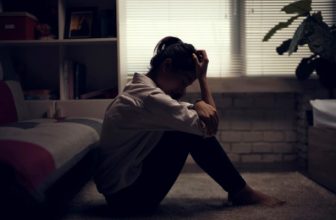
Depression is a mental health disorder that affects millions of people worldwide. It is characterized by persistent feelings of sadness, hopelessness, and a loss of interest or pleasure in activities. Depression can also cause a wide range of physical and emotional symptoms, such as changes in appetite and sleep patterns, difficulty concentrating, and thoughts of suicide. It can have a significant impact on a person’s overall well-being and can interfere with daily life.
The causes of depression are not fully understood, but a combination of factors such as biological, environmental, psychological, and medical conditions can contribute to the development of depression. Understanding depression and its causes is important in order to seek help and get the right treatment.
Major Causes of Depression
The causes of depression are not fully understood and are likely to be the result of a combination of factors, including:
- Biological factors: Changes in brain chemistry, genetics, and hormonal imbalances can play a role in the development of depression. Research has shown that certain neurotransmitters, such as serotonin and norepinephrine, are involved in regulating mood and that imbalances in these chemicals can contribute to depression.
- Environmental factors: Stressful life events, such as the loss of a loved one, a significant change in circumstances, or a traumatic experience can trigger depression. Chronic stress, poverty, and living in an unsafe environment can also increase the risk of depression.
- Psychological factors: Negative thinking patterns, low self-esteem, and a history of negative experiences can contribute to the development of depression.
- Medical conditions: Chronic medical conditions, such as heart disease, diabetes, and cancer, as well as certain medications, can also increase the risk of depression.
It’s important to note that depression is a complex disorder and that not everyone who experiences one or more of these risk factors will develop depression. Additionally, many people who develop depression have no obvious risk factors. But understanding these factors can help in seeking help and getting the right treatment.
Medicines That Cause Depression
Certain medications can cause depression as a side effect. Medications that have been associated with depression include:
- Beta blockers: These medications, used to treat high blood pressure and heart conditions, can cause depression in some people.
- Steroids: Long-term use of steroids, such as prednisone, can cause depression, mood swings and other emotional changes.
- Interferon: Interferon, a medication used to treat certain viral infections and cancer, can cause depression, anxiety, and other emotional changes.
- Accutane: Accutane, a medication used to treat severe acne, can cause depression and thoughts of suicide in some people.
- Hormone replacement therapy: Hormone replacement therapy (HRT) can cause depression in some women.
- Sleeping pills: Some sleeping pills, such as benzodiazepines, can cause depression as a side effect.
- Painkillers: Long-term use of painkillers, such as opioids, can cause depression and other emotional changes.
It’s important to note that these medications can also be used to treat other conditions, and their benefits may outweigh the risk of depression in some people. If you’re on a medication and experiencing depression or other emotional changes, it’s important to talk to your doctor. They may be able to adjust your dosage or switch you to a different medication that does not have these side effects.
Depression, Thyroid, and Hormones
Depression can be associated with thyroid and hormone imbalances. The thyroid gland produces hormones that regulate metabolism, and an imbalance in these hormones can lead to a range of physical and emotional symptoms, including depression. Hypothyroidism, a condition in which the thyroid gland doesn’t produce enough hormones, can cause fatigue, weight gain, and depression. Hyperthyroidism, a condition in which the thyroid gland produces too much hormones, can cause anxiety, insomnia, and mood swings.
Hormonal imbalances can also contribute to the development of depression. For example, imbalances in estrogen and progesterone, which occur during menopause and perimenopause, can cause depression and other mood-related symptoms.
It’s important to note that while depression can be associated with thyroid and hormone imbalances, it’s not always the case, and not everyone with a thyroid or hormone imbalance will develop depression. However, if you have symptoms of depression and a thyroid or hormone imbalance, it’s important to talk to your doctor. They may be able to adjust your medication or treatment to help alleviate the symptoms of both conditions.
It’s important to be evaluated by a healthcare professional if you suspect you may have an imbalance in your thyroid or hormones, and if you have symptoms of depression. An accurate diagnosis and proper treatment can help alleviate the symptoms and improve overall well-being.
Depression Caused by Chronic Illness
Depression is a common complication of chronic illness and can have a significant impact on a person’s overall well-being. Chronic illness, such as heart disease, diabetes, cancer, and other conditions, can cause physical, emotional, and psychological stress, which can contribute to the development of depression.
Some of the ways in which chronic illness can contribute to depression include:
- Physical symptoms: Chronic illness can cause pain, fatigue, and other physical symptoms that can make it difficult for a person to carry out daily activities and can also affect sleep and appetite. These symptoms can contribute to feelings of hopelessness and helplessness.
- Social isolation: Chronic illness can limit a person’s ability to participate in social activities and can lead to feelings of isolation and loneliness.
- Financial stress: Chronic illness can lead to increased medical expenses and loss of income, which can cause financial stress and contribute to feelings of hopelessness.
- Medication side effects: Some medications used to treat chronic illness can have side effects that can contribute to depression, such as weight gain, insomnia, and sexual dysfunction.
- Coping with a chronic condition: Chronic illness can also affect a person’s self-esteem, self-worth and sense of identity, making it hard to cope with the diagnosis and adapt to the changes it brings.
It’s important for people with chronic illness to be aware of the signs and symptoms of depression and to seek help if they think they may be experiencing it. Treatment for depression in people with chronic illness can include therapy, medication, or a combination of both. A multidisciplinary approach that includes addressing the underlying medical condition, as well as providing emotional support, can be beneficial.
Depression and Chronic Pain
Chronic pain and depression are closely related and often occur together. Chronic pain is defined as pain that lasts longer than 12 weeks, and it can have a significant impact on a person’s physical, emotional, and psychological well-being. Depression is a common complication of chronic pain, and it can have a negative impact on a person’s ability to function in daily life.
Some of the ways in which chronic pain can contribute to depression include:
- Physical symptoms: Chronic pain can cause fatigue, sleep disturbance and changes in appetite, which can contribute to feelings of hopelessness and helplessness.
- Social isolation: Chronic pain can limit a person’s ability to participate in social activities and can lead to feelings of isolation and loneliness.
- Financial stress: Chronic pain can lead to increased medical expenses and loss of income, which can cause financial stress and contribute to feelings of hopelessness.
- Coping with chronic pain: Chronic pain can also affect a person’s self-esteem, self-worth and sense of identity, making it hard to cope with the diagnosis and adapt to the changes it brings.
- Medication side effects: Some medications used to treat chronic pain can have side effects that can contribute to depression, such as weight gain, insomnia, and sexual dysfunction.
It’s important for people with chronic pain to be aware of the signs and symptoms of depression and to seek help if they think they may be experiencing it. Treatment for depression in people with chronic pain can include therapy, medication, or a combination of both. A multidisciplinary approach that includes addressing the underlying pain condition, as well as providing emotional support, can be beneficial.
Treatments for chronic pain, such as physical therapy, occupational therapy, and cognitive-behavioral therapy, may also help alleviate symptoms of depression. In some cases, a combination of medication and psychotherapy may be the best approach.
Grief and Depression
Grief and depression are closely related, but they are not the same thing. It is a natural and normal response to the loss of a loved one or a significant change in circumstances. It can cause feelings of sadness, guilt, anger, and loneliness. These feelings may be intense, but they usually lessen over time.
Depression, on the other hand, is a mental health disorder characterized by persistent feelings of sadness, hopelessness, and a loss of interest or pleasure in activities. Depression can also cause a wide range of physical and emotional symptoms, such as fatigue, changes in appetite and sleep patterns, difficulty concentrating, and thoughts of suicide.
Grief can lead to depression, and people who are grieving may also experience symptoms of depression. Grief can be complicated, and it can be difficult to distinguish between normal grief and depression. However, if the symptoms of sadness, hopelessness, and loss of interest or pleasure in activities persist for more than two weeks, or if they interfere with daily life, it may be considered depression.
It is important to seek professional help if you are experiencing grief or depression, as early intervention can improve the chances of recovery. A mental health professional can help you identify the difference between grief and depression, and provide you with appropriate treatment.
Treatment for depression can include therapy, medication, or a combination of both.
Alcohol and Depression
Alcohol and depression are closely related, and alcohol abuse can increase the risk of developing depression. It is a central nervous system depressant, and excessive drinking can cause changes in brain chemistry that can contribute to feelings of sadness, hopelessness, and a loss of interest in activities.
Drinking alcohol can also worsen the symptoms of depression, making it more difficult for a person to recover. Alcohol can also interfere with the effectiveness of antidepressant medications and make it more difficult for a person to engage in therapy.
Additionally, people who have depression may be more likely to turn to alcohol as a way of coping with their symptoms, which can lead to a cycle of alcohol abuse and worsening depression.
It’s important for people who have depression or a history of alcohol abuse to be aware of the potential risks and to seek help if they think they may have a problem. Treatment for alcohol abuse and depression can include therapy, medication, or a combination of both, as well as support groups and other resources.
It is important to seek professional help if you are struggling with both alcohol abuse and depression, as they can worsen each other. A mental health professional can help you address both conditions, and provide you with appropriate treatment.
Conclusion
In conclusion, depression is a common mental health disorder that can have a significant impact on a person’s overall well-being. The causes of depression are not fully understood, but a combination of factors such as biological, environmental, psychological, and medical conditions can contribute to the development of depression.
Depression can also occur in combination with other mental health disorders, such as anxiety disorders, bipolar disorder, schizophrenia, eating disorders, and substance abuse. Additionally, depression can be associated with chronic illnesses, chronic pain, grief, and alcohol abuse.
It’s important for people who think they may be experiencing depression to seek help from a mental health professional. Treatment for depression can include therapy, medication, or a combination of both, and it may also address the underlying condition to achieve optimal results.
It is important to be aware of the signs and symptoms of depression and to seek help if you think you may be experiencing it. With the right treatment and support, people with depression can recover and lead fulfilling lives.




